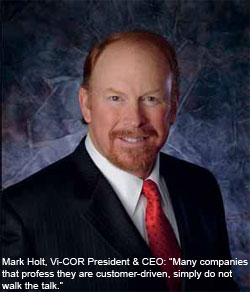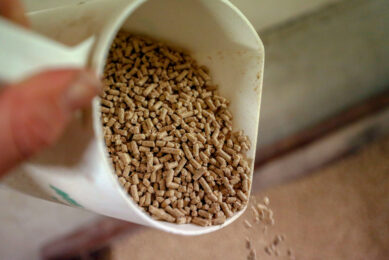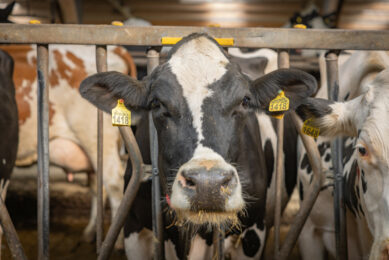“Customer happiness is key to being successful”

Mark Holt bought International Whey Technics Ltd. in Mason City, Iowa, USA from a family trust in 1999. Three customers in Asia accounted for 85% of the company’s $1.2 million in sales. “I knew that number needed to change and I knew how I planned to do it,” says Holt. Over the next decade, the company now called Vi-COR and which develops and sells yeast-based products for livestock feed, introduced many innovative “firsts” and increased its income by 30% annually. Last fall, Holt began gearing up for the next decade of success.
Mark Holt took the scenic route to company ownership, travelling his own career path before finding his way back to his family’s business. His father, William R. Holt, purchased the company in 1972, changing the name from Ferment-A-Feeds to International Whey Technics, Ltd. The company was founded in 1963 to recover cheese whey from creameries, dry it and mix it with corn gluten feed, and sell it to pig producers. Under the senior Holt’s guidance, the fermentation process was refined and perfected and in 1974 the company received a patent for it. The product was sold to feed manufacturers in the upper Midwest and Canada. “The company made a lactic acid fermentation product,” Holt explains. “Sort of yogurt for cows.”
Following the death of his mother in 1994 and his father in 1995, the company was placed in a trust and continued to operate under a management team. At the time of his father’s death, Holt was Midwest regional sales representative at Chris Hansen Laboratories (today known as Chr. Hansen) in Milwaukee, selling microbial feed additives and silage inoculants—live yeast culture products—to dairy farms and feed manufacturers. After joining the company in 1989, he became one of the top sales people for the international giant’s feed division.
Holt was content to leave his father’s company in a trust and let it continue to operate on an autopilot of sorts. “It was being run by people who had worked for my father and I didn’t have a problem with the way things were going,” says Holt.
But that opinion changed when a manager from his father’s company approached him and said the company’s survival was overly dependent on three main customers. “He told me, if these companies fail, our company will fail,” says Holt. “He asked what I wanted to do about that.”
The first of many “firsts”
After considering the options, Holt decided to buy the company from the family trust in 1999. “I mortgaged all I had and bought the business,” he says. At that time the company employed eight people. With the reins in his hands, Holt changed the company name to Varied Industries Corporation and set his eye on $5 million in sales in five years and $10 million in 10 years.
He saw many opportunities for an innovative company in the yeast fermentation industry, which had been almost unchanged and unchallenged for six decades. He intended to awaken the industry’s sleeping giants. “The industry talked about metabolites being beneficial, but no one knew why,” says Holt. “I knew there was great potential for growth.”
Holt invested in one fermenter initially (three more were added by 2004) and turned to industry connections, cultivated through his decade at Chr. Hansen, to develop yeast diets and fermenter designs. “Having the dryers already at the plant allowed us to penetrate the market quickly,” he explains.
In 1999, A-MaxSRTm Yeast Culture was born. The product uses a proven strain of Saccharomyces cerevisiae, which has been sold as live cell yeast to the agricultural community for many years. While it is a popular and proven feed additive for dairy and other non-pelleted diets, it was not conducive for use in the pelleted diets used with calves.
A-Max is Holt’s response to this need. He rented a trade show booth, borrowed a trailer and drove his new product to the American Feed Industry Association show in Indianapolis, Indiana. “It went very well,” says Holt. “We were next to the beer garden, which didn’t hurt.” A-Max was Holt’s first attempt at developing an innovative product, and it was a huge success. By 2003, the company was selling its product in nearly 50 states and 21 countries, doubling its sales base in only a few years. In 2004, Vi-COR introduced CelmanaxSRTm, further proof of the company’s commitment to research and innovative products. Celmanax, described by Holt as a “new class in cell culture,” uses a blend of enzymes and process techniques to separate the beneficial structural components of the yeast cell wall.
“For the first time in the history of the industry, Vi-COR was able to qualify and quantify the metabolites of yeast fermentation and their benefits for livestock,” says Holt. “The competition said it couldn’t be done. But it can be done and we did it first. Now the competition is lining up to copy our break-through.”
Upgrading for success
According to Holt, it has long been accepted that adding yeast to the diets of cows, swine, poultry, horses and other animals promotes healthy digestion and an increase in performance. The yeast fermentation process is an exacting one and includes an aerobic and anaerobic process, with the final product being a yeast product that boosts the health of livestock.
Vi-COR conducts the fermentation process under the same rigorous standards followed by the food industry. In 2000, Holt launched a $3 million upgrade of the company’s lab and plant to ensure that it would maintain the high standard necessary for a competitive company in the manufacture of yeast-based products. Lab upgrades included the purchase of analytical equipment that is used daily to conduct quality checks for fermentation and moisture. Each batch of product is monitored from start to finish. The company also sends samples to independent, certified laboratories, and establishes a metabolite level guarantee based on their analysis. Improvements in Vi-COR’s plant included upgrading its aerobic and anaerobic fermenters and automating its packaging and palletising equipment. Vi-COR products are offered by bag, tote (bag in box) and truckload. Custom manufacturing options are also available.
Greatness judged by customers
Holt’s philosophy for building a successful business is to put the customer first. He says, while it may be trite and over-used, many companies that profess they are customer-driven, simply do not walk the talk. But a decade of visiting farms and feed manufacturers in his past career taught him that customer happiness is, in fact, the key to successful sales. “The minute I got it—the minute I stopped thinking about me and how much a sale would be worth to me and started focusing on how to help the customer grow their business—is the day my career took off,” remembers Holt.
Holt also believes he needs to staff his company to grow. “That means hiring ‘A’ people,” he says. “If we do this, if we wait and take our time and bring only top people on board, we will get where we want to go.” The company now employs 37 people with the goal of adding ‘A’ players in technical support, sales and production.
During the past 10 years, Holt has focused his company on researching and developing innovative products in response to customer needs, and on doing it better than anyone else. His business approach has worked, surpassing his 5-year goal of $5 million and his 10-year goal of $10 million.
While he has advertised on occasion and has steadily appeared at industry trade shows, the focus was on developing the product, not telling the story. Now that has changed. “We have a solid customer base and new customers come on board all the time,” says Holt. “But there are many producers out there who are still unaware of what Vi-COR has to offer. That’s going to change. Our objective is to be a leader in the industry for providing natural solutions to animal health, performance and nutrition. And we’re going to get there by hiring the right people.”











